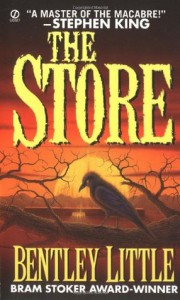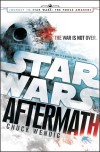The Store
 Five books in, and I have to concede that Little tells a pretty good tale. The Mailman is the standout, and The Ignored is the one that I should have ... well, ignored, but his stories still build up in a regulated fashion. I like the way his books keep building suspense from the beginning to, if not the end, at least to about the 85% point in the book. I can't deny that he seems to have difficulties closing the deal, but the build-up to that point is palpable. It's pretty amazing.
Five books in, and I have to concede that Little tells a pretty good tale. The Mailman is the standout, and The Ignored is the one that I should have ... well, ignored, but his stories still build up in a regulated fashion. I like the way his books keep building suspense from the beginning to, if not the end, at least to about the 85% point in the book. I can't deny that he seems to have difficulties closing the deal, but the build-up to that point is palpable. It's pretty amazing.This time, Little takes on the mega corporation retail stores like Wal-Mart. He makes some astute observations about what it means to small towns when those businesses move in and begin to take over. There's a predatory vibe that comes along with the businesses, and what I've read about their practices in the real world is reflected in the book. Of course, Little takes it to extremes, and it's somewhat reassuring to see that he makes the motivation behind the greed and assimilation a kind of nameless, supernatural evil; it beats the fact that people are just greedy for more, more, more.
I'm a little torn between the storytelling and the apparent misogyny within. I started noticing the way Little treated his female characters with The Town (one of the characters thinks his daughter has been coming on to him, and in his paranoid killing spree, he shoots her right in the crotch), but that kind of treatment had been in the other two books I'd read. In The Ignored, rape was seen by some of the Ignored as an acceptable way to exact revenge on those who ignored them. Then again, none of the characters who were acting on this kind of behavior were the good guys; they were the possessed, the evil, or the despicable (all of which, coincidentally, sound like three unpublished Bentley Little books). Still, it's bothersome that Little relies on this kind of behavior to define how bad his characters are. There are other ways that he could show how terrible his antagonists are.
At the same time, I think of the criticism that George R.R. Martin and the producers of Game of Thrones received for having Ramsey Bolton rape Sansa Stark in the last season. I had a hard time accepting the criticism for a number of reasons, one of which was, "Have you seen what that Bolton kid is capable of?" He's a twisted character, but he's established that violence, torture, and sex are all kind of interrelated for him. He and his girlfriend chased down another woman, and then had sex after killing her; the scene between him and that same woman in Winterfell was tinged with violence; and then there was the whole deal with Theon. Plus, Martin drew on real history as he wrote this story, and rape was a common method of punishment and warfare during Medieval times. Yes, it's terrible, but it's historically accurate.
The difference, I think, is in how Martin created those women characters in his story. They're strong and powerful in their own ways. They recognize that their positions in that era are not strong, and that their strongest weapon is their femininity, and they use it in different ways. Cersei uses it to gain power through other people; Sansa uses it to stay hidden, pretending to be innocent and unaware while gathering intelligence; and Arya uses her "weak girl" persona to trick everyone into underestimating her. The characters, to me, are strong feminist characters, despite the fact that they live in a world that doesn't value or recognize them.
Little, on the other hand, doesn't seem to have that kind of prescience with his female characters. The women raped in The Ignored were tertiary characters at best, brought in just to be raped, and the daughter in The Town was shown making poor choices, leading up to a gang bang before she was killed. She was punished because of her femininity, not despite it, and I think that's the divide I keep having to cross when I read Little's books.
Still, the story is compelling, and even thoughtful. It makes me want to stop shopping at any megastore corporation and spending all my money at local stores. I've justified shopping at Target, Publix, and Costco because they treat their employees better than some other megastores I could name, but still, those are as much megastores as Wal-Mart. The book doesn't make me afraid of those stores, but it does get me thinking about the real-life consequences that they bring to communities.






